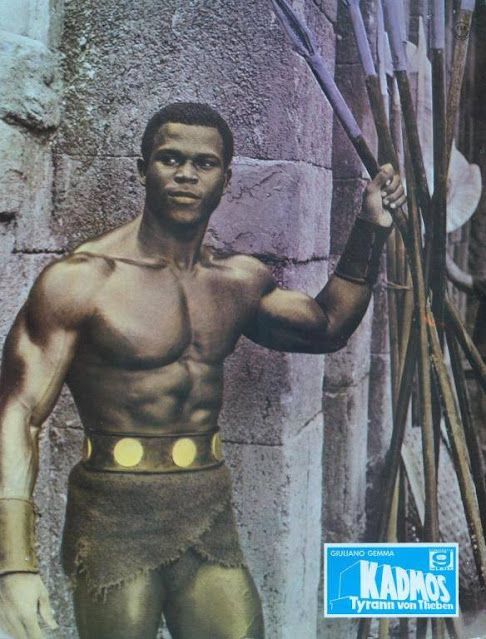PHENOMENALITY: *marvelous*
MYTHICITY: *good*
FRYEAN MYTHOS: *adventure*
CAMPBELLIAN FUNCTION: *metaphysical, psychological* SPOILERS SPOILERS SPOILERS THE TITANS-- given the spoofy title MY SON THE HERO in an American release-- isn't representative of what the Italian peplum-subgenre was, but I sure wish it had been. Duccio Tessari hit this one out of the park in his first directorial outing, though to be sure he had scripted or co-scripted about a dozen historical-adventure movies before TITANS. Possibly he decided he was going to throw his best efforts with respect to action, comedy and pageantry into this film, which ended up being his last real contribution to the subgenre. It's possible that Tessari's collaboration with long-time writer Ennio de Concini, who'd also labored in peplum-fields, resulted in the superior script. (They'd also collaborated, along with several other authors, on the above average GOLIATH AND THE DRAGON in 1960, but IMDB lists only De Concini and Tessari as co-writers for TITANS.)
In my peplum-reviews I've often picked at movies that jumbled mythological motifs. However, TITANS messes with a lot of archaic stories but produces a story that's logical on its own terms. In Greek mythology, Cadmus is a culture hero who founds the city of Thebes, and he marries Harmonia, a female occasionally given associations with ill luck. In TITANS, we first see Cadmo, King of Crete (Pedro Armendariz) and Ermione (Antonella Lualdi) in a subterranean cavern filled with mists. This is apparently the legendary Cave of the Sibyl. The two newly married royals have brought along two others: the dead body of Cadmo's previous wife and the infant daughter she birthed before Cadmo murdered the mother. The Sibyl knows exactly what the sinful couple have done and asserts that the gods of Olympus will destroy them. Further, the Sibyl claims that when the king's daughter Antiope grows to womanhood, her lover will slay Cadmo. Also, the king will die if he kills his daughter, so he, like the villains of the Jason and Perseus myths, must allow the seed of destruction to grow-- though Cadmo plans to keep Antiope cloistered so that she cannot meet men. (Parenthetically, in some variations Antiope is the name of Cadmus's mother.) And to block the possibility of immediate vengeance from Jove on high, Cadmo and Ermione bathe in the waters of the subterranean cave, becoming invulnerable to harm, as Achilles was rendered by the waters of the River Styx. (Incidentally, a minor character in TITANS is named Achilles.)
Though Cadmo compounds his crime of murder by setting himself up as the God of Crete, Jove in his heavens tolerates this impiety for the next twenty years, until the babe Antiope grows into a nubile princess (Jacqueline Sassard). At this point Jove decides to liberate one of the heroic Titans whom he Jove condemned to Tartarus. Said hero is the youngest and cleverest Titan, Krios (Guiliano Gemma), though he isn't told that he's supposed to fall in love with Antiope.
To get close to Cadmo for the purpose of wreaking holy vengeance, Krios becomes one of the king's gladiators. This allows him the chance to "meet cute" with Antiope. The young Titan wins the court's favor by overcoming a boulder-shouldered Black African combatant named Rator, but the generous hero also asks the King to spare Rator's life. But then Evil Cadmo decides he wants to stage his own version of "The Most Dangerous Game" with Rator as the quarry, and though Krios seeks to temporize, Cadmo's pursuit finally corners Rator near a cliffside. At this point Krios has to reveal his mission to condemn the king to Hades. Ermione shows up with reinforcements, and since Krios' sword just breaks on the flesh of the invulnerable king, the Titan and his new buddy are forced to jump off the cliff to escape, seven years before Butch Cassidy and the Sundance Kid did the same. (By an odd coincidence Gemma and Tessari collaborated that same year on a western comedy, and an American marketer retitled it "Sundance Cassidy and Butch the Kid.")
Since Krios has taken his best shot at doing things the mortal way, he then starts seeking to use supernatural weapons. From Tartarus he acquires an invisibility helmet and infiltrates Cadmo's castle, but his main mission is to find Antiope. Krios learns that his love has been moved to an island guarded by a Gorgon, complete with petrifying gaze, so Krios has got to do a Perseus to get past her. Krios rescues his princess, but Cadmo and Ermione get the upper hand again. Krios prays to Jove for help, calling Jove his "father" (maybe metaphorically?), and Jove releases the other eight male Titans from Tartarus to render aid. The big confrontation returns to the Sibyl's Cave, as Cadmo mounts one last defense, and Krios essentially performs the function of Jove by sending the evildoer to Greek Hell. Before watching TITANS, which I only saw once before some thirty years ago, I would have said Tessari's 1975 ZORRO was his best work. But now TITANS is my fave Tessari work, my favorite peplum, and will henceforth appear on my list of the hundred best magical-fantasy films, if I ever compile one. (Addendum: I included the category "clansgression" for this movie because of a line in which Antiope claims to be "consecrated" to her father the God of Crete, but this doesn't imply any incestuous intent on Cadmo's part, as I don't even think Cadmo and Antiope even have scenes together.)





No comments:
Post a Comment